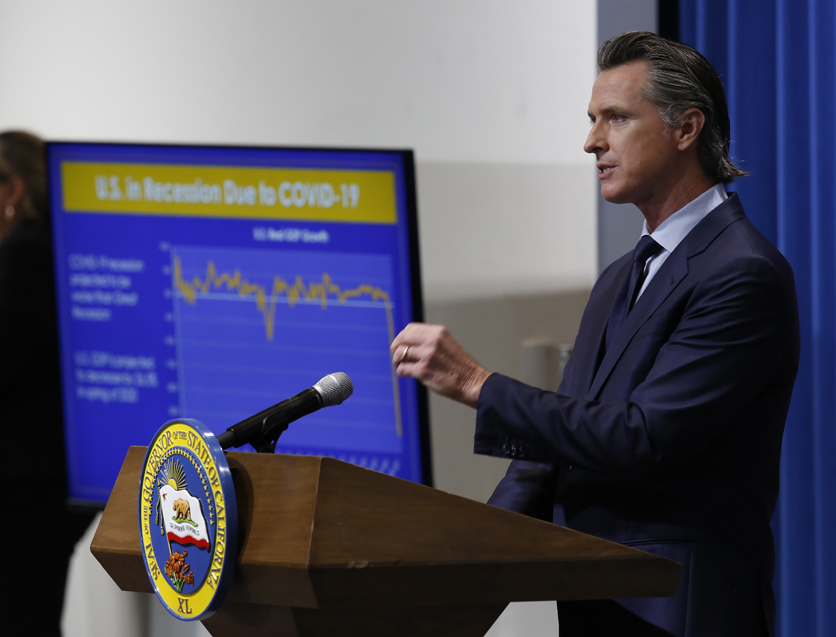As the next step in the ongoing budget process, the Legislature is set to vote on a new budget agreement later this week. More details emerged Tuesday about this compromise between lawmakers and the governor and where the spending cuts will come down. The situation is also continually changing as more trailer bills have been introduced this week, and will continue to be over the coming months.
“We made compromises across the spectrum,” said Gov. Gavin Newsom at a press briefing on Monday hours after he reached an agreement with the Legislature, though he shared little on the compromises made.
A joint statement that morning by Newsom and Senate President Pro Tem Toni Atkins and Assembly Speaker Anthony Rendon said the deal “required some tough decisions and more work remains ahead.”
While the governor is likely to approve the agreement before the July 1 start of the new fiscal year, the budget situation will remain fluid for months to come and all of the traditional budget deadlines can be extended. Tax revenues will come in July 15, two days after the Legislature returns from summer recess and begins work on “Budget 2.0,” as lobbyists are calling it.
“The final package of trailer bills – there is usually more than 40 – is not customarily finished until the final week before the August 31 adjournment,” explained Bob Gore, a policy advocate representing agriculture and irrigation groups for the Gualco Group, in an email to Agri-Pulse. “The governor then has until September 30 to decide.”
Gore added that adjustments could still be made through mid-October.
To close a projected deficit of $54 billion, the administration and lawmakers are now agreeing to reduce state salaries by 10% and trim more than $600 million from the two university systems, unless the federal government follows through with more aid before October.
The cut to UC campuses withdraws a 5% boost for the Division of Agriculture and Natural Resources (ANR) that was proposed in January by the Newsom administration.
“We are still sitting with less than half as many Cooperative Extension people in the field as we had 20 years ago,” said UC ANR Vice President Glenda Humiston, in a presentation to the California Food and Agriculture Board in May. “This is due to 20 years of either shrinking or flat budgets.”
The governor’s May Revision of the budget proposal then trimmed another 5%. Now the budget agreement adds another 7% cut, dropping ANR's budget to $63 million.
Another surprise this week was the resurrection of the governor’s proposed Climate Catalyst Revolving Loan Fund in one of the many trailer bills supporting the main budget bills. Newsom had initially proposed the fund in January as part of his “climate budget.” The program would offer businesses low-interest loans for infrastructure improvements and green technology. This would also support the CDFA’s dairy digester, water efficiency and agricultural equipment upgrade programs, as well as composting projects and wood waste reuse. The new proposal carries the same language and works through the same mechanisms as the original.
Yet farm groups are still hesitant to endorse more loans for farmers and would instead like to see funding restored and improved for those incentives programs.
“Farmers are unlikely to take on additional debt, particularly small, diversified and socially-disadvantaged farmers, as well as the state’s dairy farmers, who have been operating in a deficient state for several years,” said Jeanne Merrill of the California Climate and Agriculture Network earlier this year.
The budget agreement to be signed this week by lawmakers includes a provision to allow the California Air Resources Control Board to reopen rulemaking on the state’s cap-and-trade market "in order to build a new cap-and-trade auction platform and market registry database." Farm groups and some lawmakers have opposed the action, arguing it moves negotiations behind closed doors. It is unclear if the Climate Catalyst Fund will separately complement the cap-and-trade program or directly support it, according to Taylor Roschen, a legislative advocate for the California Farm Bureau Federation.
Interested in more coverage and insights? Receive a free month of Agri-Pulse or Agri-Pulse West by clicking here.
Meanwhile, a separate trailer bill is raising new concerns over the State Water Resources Control Board's approach to long-held water rights contracts.
The board would be allowed to take action on water quality certifications before the environmental review process has been completed to meet the requirements of the California Environmental Quality Act. Assemblymember Adam Gray, D-Merced, is arguing this would allow the board to force hydroelectric utilities to double the amount of water flows dedicated to environmental conservation.
“That could lead to enormous water losses for northern San Joaquin Valley growers without providing any proven benefits to fish and wildlife,” he writes in a recent op-ed for GV Wire. “Efforts are underway to force this issue out into the open so we can reach a reasonable compromise, but those efforts have fallen short so far. So proponents are pushing for a vote as soon as possible.”
For more news, go to: www.Agri-Pulse.com


